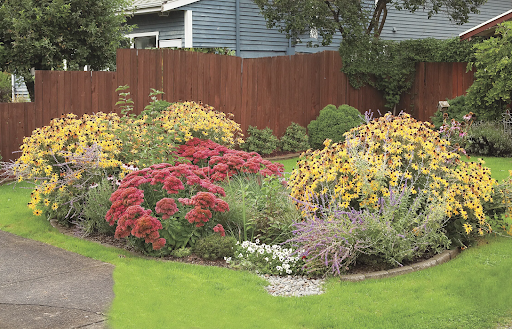How can I help tackle climate change?
Looking after gardens, green spaces and biodiversity
If managed well, gardens can provide a rich habitat to a wealth of species in Kingston. This not only includes garden birds that adorn bird feeders, but also hedgehogs snuffling amongst the undergrowth, butterflies wafting around on warm summer's breeze and even a charismatic stag beetle clumsily flying around on a late evening in May.
By making your garden a friendly place for wildlife you can actively help to stop species going locally extinct. Visit our dedicated biodiversity pages to find out how you can help at home.
Composting
Composting is an environmentally friendly way of recycling your kitchen scraps and garden waste and an inexpensive way to provide nutrient-rich compost for your garden. Most of your kitchen scraps can be composted and the rest can go in your food waste bin for collection.
Rain Gardens
Rain gardens are an example of landscaping that helps nature by supporting drainage and biodiversity. This page has information about creating your own rain garden on your property. Kingston Council also has funding for proposals to create a number of rain gardens in our neighbourhoods that will benefit our communities with a beautiful feature and improve resilience to surface water flooding.
London, including Kingston, is at risk from surface water flooding which occurs when heavy rain falls on hard surfaces overwhelming drainage and sewers. Find out more about flooding drainage in Kingston.
Rain gardens are designed to be both beautiful and functional. They soak up and naturally filter rainwater, preventing it from causing problems and enhancing water quality year round. They also provide more biodiversity as a habitat for local wildlife. Find out more about encouraging biodiversity in gardens.

An example of a Rain Garden. (Source: This Old House)
Benefits of a Rain Garden
- Flood Prevention: Rain gardens soak up excess rainwater, reducing the risk of flooding in your area.
- Cleaner Water: They act like filters, removing pollutants and dirt from rainwater before it reaches our rivers and streams, helping to keep our water clean.
- Biodiversity Boost: Rain gardens are like a wildlife magnet, attracting birds, bees, butterflies, and other beautiful creatures. They create a mini-habitat right in your neighbourhood.
- Beautiful Landscaping: A well-designed rain garden can boost the look of the street or property, enhancing your community's beauty, and reducing maintenance needs.
- Cost-Efficient: By managing rainwater effectively, you can save money on drainage systems and help the drainage infrastructure work better.
- Sustainability: Rain gardens are eco-friendly. They conserve water, support local ecosystems, and reduce our carbon footprint.
How to create a Rain Garden
- Choose the Right Location: Select an area where water naturally collects, preferably 10 feet (3 metres) or more from your home's foundation.
- Plan Your Garden: Determine the size and shape of your rain garden, considering the amount of runoff it will handle.
- Select Native Plants: Choose native plants that can withstand wet and dry conditions, as they require less maintenance and attract local wildlife.
- Excavate the Area: Dig a shallow depression (usually 6-12 inches deep) in the chosen location.
- Amend the Soil: Improve the soil's infiltration capacity by adding compost or other organic matter.
- Plant Your Garden: Arrange your chosen plants in the rain garden, and mulch to suppress weeds.
- Maintain Your Rain Garden: Regular weeding and occasional mulching will keep your rain garden healthy.
Rain gardens are not just beautiful; they're smart and eco-friendly too. By building a rain garden you contribute to cleaner water, reduced flooding, and a thriving ecosystem. So, consider creating your own rain garden or supporting one and be a guardian of nature right here in our fantastic council. Enjoy the beauty and benefits of a rain garden today!
